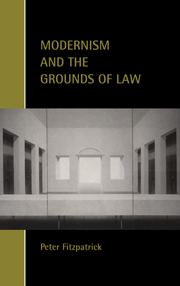Introduction: Terminal Legality
Published online by Cambridge University Press: 05 July 2014
Summary
Extravagant as it may seem, this whole work is initially encapsulated in Freud's attempt to locate the origin of society in the primal parricide of Totem and Taboo (Freud 1960). Here Freud turned to ‘the originary question of grounds’, to borrow the phrase (Derrida 1989a: 60). And what his effulgent myth of origins reveals are grounds of law within a social existence bereft of the transcendent variety. These grounds are possessively ‘of’ law in that they ground law yet law also grounds them. So, one argument will run, elements of modern society provide grounds of law but these elements become socially effective when brought together by law. In this introduction, then, Freud's alluring tale will be pressed into summary service in order to situate the analysis of law's grounds in a preliminary and graphic way. That analysis will then be more conventionally abbreviated.
Freud is so often advanced as the parent of a self-conscious modernism, and in Totem and Taboo he was particularly concerned to account for the emergence and quality of society in its modern, self-sufficient mode, and for Freud law was central to such a society. His fantastic story is really one of two origins. It begins with a desolate stasis in which the savage ‘primal horde’ somehow exists under the complete sway of the father. This is a place of utter fixity where nothing can be other than what it is. Somehow, in this stilled scene, action erupts and the father is killed and consumed by his sons.
- Type
- Chapter
- Information
- Modernism and the Grounds of Law , pp. 1 - 8Publisher: Cambridge University PressPrint publication year: 2001



